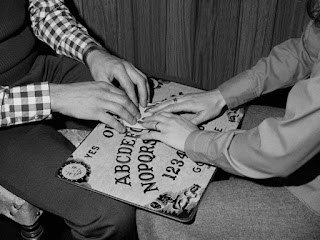Halloween Special: Using a Ouija board to escape captivity

In this occult-themed blog, published on Halloween, stage magic and ‘black magic’ overlap. In this remarkable story, a magician and his confederate use a Ouija board, conjuring techniques and deceptive thinking to pull off the most celebrated prisoner-of-war escape of World War One. Picking-up on this idea, a group of British POWs in World War Two attempted to repeat this success. Ouija - The Wonderful Talking Board A Ouija board is, typically, a flat wooden board about 2 feet by 1 foot in size. Painted or printed on one side of the board are all the letters of the alphabet, the numbers 0 to 9, ‘Yes’ and ‘No’ and the word ‘Goodbye.’ A teardrop-shaped device, known as a planchette (or an upturned small glass) manoeuvres around the board acting as a pointer. The idea of the board is that two or more people sit around the board, place their fingertips on the planchette, pose a question, and watch, dumfounded, as the planchette moves from letter to lett...
